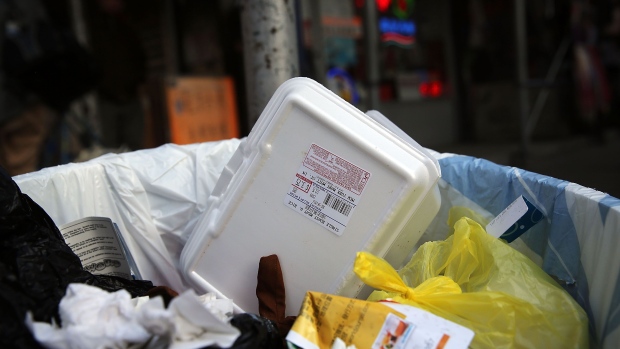Sep 18, 2019
Standardized Labels Could Drastically Reduce Food Waste
, Bloomberg News

(Bloomberg Opinion) -- Many efforts to minimize climate change are far removed from people’s everyday lives. It’s the responsibility of unseen others to reduce power-plant emissions or regrow carbon-absorbing forests. But there is one significant way almost everyone can help, and that is by wasting less food. Americans in particular consume only about half as much of what’s in their refrigerators as they plan to, a new study has found.
One big reason for this flagrant waste is confusion about how long food keeps — confusion fostered by the great variety of date labels found on packaged foods. More than 80 percent of Americans throw out food when it’s close to or past its stamped date, previous surveys have found, often because they read the labels wrong. And that’s understandable, because the dates listed are often preceded by vague phrases such as “best by” or “sell by,” which seem to refer to safety rather than quality.
Some members of Congress are trying again to solve this problem by requiring food packagers to adopt standard phrases that distinguish quality from safety. In the system proposed by recently introduced legislation, the conditional “best if used by” would mean the food may not be as appealing or tasty if eaten after the date, while the more commanding “use by” would mean the food should be discarded after the date to avoid illness. By helping Americans minimize food waste, uniform labels could help lower U.S. carbon emissions.
It’s a small step that could make a big difference. Consider that every year, the average American throws out some 400 pounds of food. Much of that ends up in landfills, where it decays, emitting methane and carbon dioxide. Add in the emissions created in the harvest, transport and selling of all this uneaten food, and it accounts for 2.6 percent of total greenhouse gas emissions in the U.S. It’s no wonder the United Nations’ climate science panel has identified eliminating food waste as a critical emissions-reduction strategy.
The U.S. government appears to agree, having set itself the goal of cutting food waste in half by 2030. Since households account for the biggest chunk of wasted food in the U.S. — about 40 percent — streamlined date labels would be a great place to start. But at the moment, no federal regulations require or regulate date labels for foods (with the exception of those on infant formula). In the absence of any rules, food companies voluntarily label their packages in dozens of different ways.
In 2017, responding to pressure from environmental groups to create clear and uniform labels, the Grocery Manufacturers Association and the Food Marketing Institute — two of the most influential industry groups — released voluntary guidelines that urged use of the phrase “best if used by” to communicate that the date is a measure of quality. The U.S. Department of Agriculture, which regulates meat, poultry, eggs and other perishable products, had backed the same language. And the Food and Drug Administration has since sent a letter to food companies endorsing the same phrasing for packaged products. But voluntary measures aren’t enough, because not every company voluntarily complies.
If labeling were mandatory, on the other hand, and if the federal government were also to provide better consumer education on food labels, nearly 400,000 tons of food waste could be prevented each year, according to ReFED, a nonprofit dedicated to reducing food waste. That would eliminate almost 1.6 million tons of greenhouse gas emissions — as much as is emitted by nearly 340,000 cars over the course of a year.
Since 2016, a string of natural disasters, including droughts, wildfires and hurricanes made more destructive by global warming, has left Americans more worried than ever about climate change, and surveys show that most Americans agree the government should be doing more to tackle the climate crisis. In the three years since Congress last tried, and failed, to pass uniform food labeling requirements, the urgency has increased.
Streamlining food labels to reduce waste is truly the low-hanging fruit of climate action. Congress should pass the legislation without delay.
To contact the author of this story: Kate Wheeling at kate.wheeling@gmail.com
To contact the editor responsible for this story: Mary Duenwald at mduenwald@bloomberg.net
This column does not necessarily reflect the opinion of the editorial board or Bloomberg LP and its owners.
Kate Wheeling is an environmental journalist based in California.
©2019 Bloomberg L.P.


